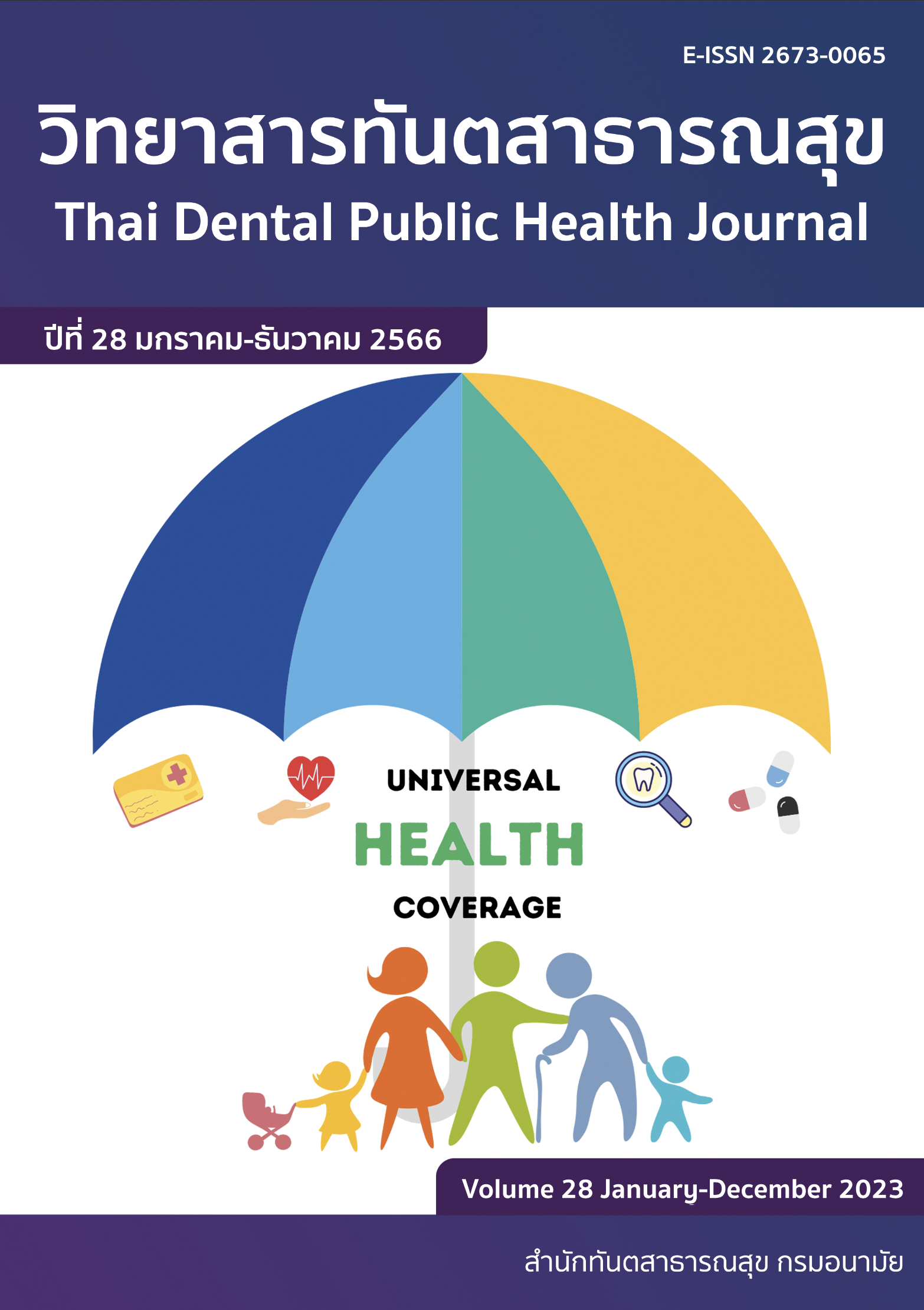The effectiveness of dental public health activities in accordance with the guidelines of the six building blocks of health system among dental personnel in Ministry of Public Health hospitals, health region 12
Main Article Content
Abstract
A quantitative cross-sectional study aimed to determine the effectiveness of dental public health activities and opinions according to the six building blocks of the health system approach of dental public health personnel in 77 hospitals, 231 dental personnel under the Ministry of Public Health in health region 12 from 1 to 14 September 2021. An online self-administered questionnaire covering 4 parts: general information, the effectiveness of dental public health activities in the hospital, an opinion toward dental public health activities per the guidelines of the six building blocks of the health system, and suggestions. 61.4% of the study group had high effectiveness. According to chi-square test, the effectiveness of dental public health activities in the hospital related with gender (p-value=0.045), education level (p-value=0.021), workplace (p-value=0.027), and dental public health activities in accordance with the six building blocks of the health system which were service delivery (p-value=0.041), dental workforce (p-value=0.039), dental health information systems (p-value=0.042), and dental product and equipment (p-value=0.043). According to logistic regression analysis, the association factors were similar to the chi-square test as follows: service delivery (p-value=0.018), dental workforce (p-value=0.030), dental health information systems (p-value=0.048), and dental product and equipment (p-value=0.029). To conclude, opinions according to the six building blocks of the health system approach Influence the effectiveness of dental public health activities. Therefore, promoting and supervision to implement the six building blocks in dental public health work will increase the effectiveness of dental public health work.
Downloads
Article Details

This work is licensed under a Creative Commons Attribution-NonCommercial-NoDerivatives 4.0 International License.
References
World Health Organization. Everybody’s business: strengthening health systems to improve health outcomes: WHO’s Framework for Action. Geneva: World Health Organization; 2007.
World Health Organization. Monitoring the building blocks of health systems: a handbook of indicators and their measurement strategies. Geneva: World Health Organization; 2010.
Universiteit Leiden. Building blocks for the development of an international framework on space resource activities. [online] [cited 2023 Jan 11]; Available from: URL:https://www.universiteitleiden.nl/binaries/content/assets/rechtsgeleerdheid/instituut-voor-publiekrecht/lucht--en-ruimterecht/space-resources/final-bb.pdf
The Federal Democratic Republic of Ethiopia Ministry of Health. Health Sector Transformation Plan. Addis Ababa, ET: The Federal Democratic Republic of Ethiopia Ministry of Health; 2015.
Hafner T, Shiffman J. The emergence of global attention to health systems strengthening. Health Policy Plan 2013; 28(1): 41-50. doi:10.1093/heapol/czs023.
Health Administration Division, Office of the Permanent Secretary Ministry of Public Health. Establish and level potential of the health service guideline. Samut Sakhon: Born to be publishing CO., LTD.; 2018. (in Thai)
Zhang D, Yan Y, Liu TF. Key factors influencing the effectiveness of hospital quality management tools: using the quality control circle as an example–a cross-sectional study. BMJ Open 2022; 12: 1-13. doi:10.1136/bmj open-2021-049577.
Tumampus JPR, Romero MJJ, Espinoza MAP, Cuya-Antonio OC. Factors Influencing the quality of health care provisions on local government units. IJRISS 2018; 2(8): 1-5. doi:10.13140/RG.2.2.18939.16162.
Grace A. Factors affecting the quality of health care services provided in government hospitals: a case study of Mulago National Referral Hospital. Thesis. Makerere University, Kampala, UG; 2013.
Zenger J, Folkman J. Research: women score higher than men in most leadership skills. [online] 25 June 2019 [cited 2019 Dec 30]; Available from: URL:https://hbr.org/2019/06/research-women-score-higher-than-men-in-most-leadership-skills
Steven B, Clotfelter CT. U.S. higher education effectiveness. RSF 2016; 2(1): 2-37. doi:10.775 8/rsf.2016.2.1.01.
Marme G. Effective health service planning and delivery: a qualitative case study exploring health service users perspectives. Research Square 2020; 1-22. doi:10.21203/rs. 3.rs-67378/v2.
Kisekka V, Giboney JS. The effectiveness of health care information technologies: evaluation of trust, security beliefs, and privacy as determinants of health care outcomes. J Med Internet Res 2018; 20(4): e107. doi:10.2196/jmir.9014.
de Oliveira EMC, Guimaraes EHR, Jeunon EE. Effectiveness of medical-care equipment management: case study in a public hospital in Belo Horizonte / Minas Gerais. Int J Innov 2017; 5(2): 234-49. doi:10.5585/iji.v5i2.117.
Warren AE, Wyss K, Shakarishvili G, Atun R, de Savigny D. Global health initiative investments and health systems strengthening: a content analysis of global fund investments. Globalization and Health 2013; 9(1): 1-14. doi:10.1186/1744-8603-9-30.
Ivanková V, Kotulič R, Gonos J, Rigelský M. Health care financing systems and their effectiveness: an empirical study of OECD countries. Int J Environ Res Public Health 2019; 16(20): 1-22. doi:10.3390/ijerph16203839.
Uneke CJ, Ezeoha AE, Ndukwe CD, Oyibo PG, Onwe FD. Enhancing leadership and governance competencies to strengthen health systems in Nigeria: assessment of organizational human resources development. Health Policy 2012; 7(3): 73-84.


